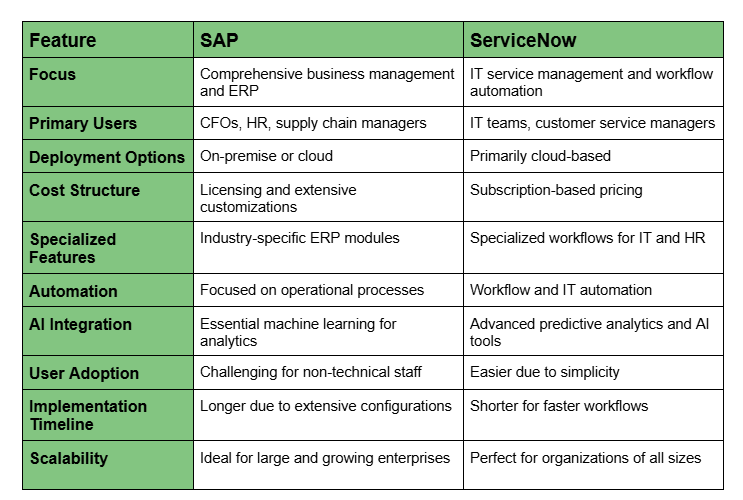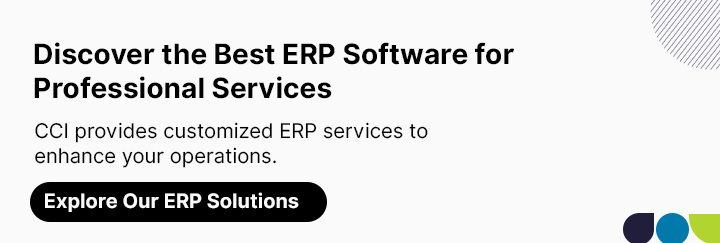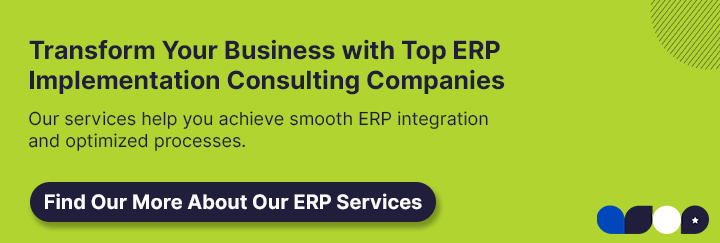SAP vs ServiceNow: Which One is Better in 2025?
Updated on February 15, 2026
SAP and ServiceNow are two giants that dominate the software solutions market, each designed to address specific organizational needs. Whether you’re an enterprise seeking ERP systems to manage end-to-end operations or looking for workflow automation to refine IT service management, understanding the strengths and limitations of these platforms is crucial. This comprehensive guide will help you explore both options and determine which aligns best with your 2025 goals.
>> Related Post: ServiceNow Pricing: Implementation Cost in 2025
What is SAP?
SAP, or Systems, Applications, and Products, is a globally recognized enterprise software that facilitates efficient resource planning. SAP’s platform allows organizations to integrate various business processes, offering them a unified system to manage everything from payroll and procurement to inventory and analytics. It serves enterprises of all sizes and scales, with its functionality particularly appealing to industries that deal with complex supply chains or multiple operational touchpoints.
>> Related Post: ERP Pricing 2025: Cost of ERP Software Implementation
Features of SAP
- ERP Integration:
SAP connects multiple business functions, such as finance, logistics, procurement, and HR, into one platform. This integration reduces inefficiencies caused by disjointed systems and creates a wider view of organizational performance. For example, real-time data updates across departments improve decision-making and enable proactive strategies.
- Customizable Modules:
SAP offers an array of modules customized to specific business needs, such as SAP HANA for analytics or SAP SuccessFactors for HR management. These modules can be configured to match industry-specific requirements, ensuring a personalized approach to business challenges. This adaptability allows companies to grow their capabilities as they scale.
- Data Management:
SAP is designed to handle and analyze vast amounts of organizational data. Its advanced data processing features help businesses understand trends, monitor key performance indicators (KPIs), and generate predictive models. This makes SAP indispensable for data-driven strategies in industries like retail and healthcare.
- Automation:
By automating repetitive tasks such as invoice processing and supply chain tracking, SAP saves organizations countless hours of manual effort. Automated workflows boost productivity and minimize errors, ensuring smoother business operations.
- Cloud Options:
SAP’s cloud solutions, like SAP S/4HANA Cloud, offer businesses the flexibility to operate anywhere and scale their systems without worrying about infrastructure. The cloud-based model also saves hardware and IT maintenance costs, making it a favorite for modern enterprises.
>> Related Post: CRM Software Price in 2025
What is ServiceNow?
ServiceNow focuses on transforming IT service management (ITSM) and optimizing workflows across organizations. Initially created as an IT ticketing system, it has evolved into an efficient platform for managing business processes in HR, customer service, and operations. ServiceNow is particularly well-suited for organizations prioritizing improving efficiency, reducing operational bottlenecks, and enhancing employee and customer experiences.
>> Related Post: Top CRM Software and Systems in 2025
Features of ServiceNow
- ITSM:
IT Service Management is the core of ServiceNow. It offers tools to manage IT requests, incidents, and changes precisely. This centralized approach reduces downtime, ensures quick issue resolution, and enhances the end-user experience.
- Workflow Automation:
ServiceNow’s workflow automation capabilities redefine operational efficiency. From onboarding new employees to resolving customer service inquiries, ServiceNow automates processes that previously required manual intervention, ensuring consistency and speed.
- Asset Management:
ServiceNow provides comprehensive tools to track and manage organizational assets. Whether it’s monitoring software licenses or physical equipment, ServiceNow helps businesses optimize asset utilization and reduce unnecessary expenses.
- AI Capabilities:
With predictive analytics and machine learning, ServiceNow empowers organizations to identify issues before they occur. For example, it can alert IT teams about potential system failures, allowing them to prevent disruptions proactively.
- Self-Service Portals:
ServiceNow’s user-friendly portals enable employees and customers to solve common issues independently. This reduces the burden on IT teams and ensures faster resolution for end-users.
>> Related Post: Benefits of ERP Systems in 2025
Differences Between SAP and ServiceNow

>> Related Post: SAP Pricing: Implementation Cost and Pricing Details [2025]
Which is Better: SAP or ServiceNow?
When deciding between SAP and ServiceNow, consider your business’s unique challenges. SAP offers unparalleled functionality if your organization requires extensive ERP capabilities to manage various departments like finance, HR, and supply chain. However, for businesses focused on enhancing IT operations, automating workflows, or improving service management, ServiceNow proves to be the better fit. Ultimately, the choice comes down to your enterprise’s core needs and goals.
>> Related Posts: Top SAP Implementation Companies in 2025
Conclusion
While SAP shines in managing comprehensive ERP systems for industries like manufacturing and healthcare, ServiceNow excels in IT service management and workflow automation. Partnering with Cloud Consulting Inc. Inc. ensures a seamless transition and optimized use of either platform, empowering your business to thrive in 2025 and beyond.
FAQs: SAP or ServiceNow
1. Can SAP and ServiceNow be integrated?
Yes, integration allows organizations to combine the strengths of both platforms, streamlining ERP functionalities with IT workflows.
2. How long does implementation take?
Due to their complexity, SAP implementations typically take months, while ServiceNow projects can be completed within weeks for faster deployment.
3. Which is more cost-effective?
ServiceNow usually has a lower upfront cost due to its subscription model, while SAP requires a higher initial investment but provides broader ERP capabilities.
4. Does ServiceNow support non-IT workflows?
Absolutely. ServiceNow extends its functionality to HR, finance, and customer service workflows, making it versatile for various departments.
5. Why should I choose Cloud Consulting Inc. Inc.?
Cloud Consulting Inc. Inc. combines expertise with a client-focused approach to deliver successful SAP and ServiceNow implementations, ensuring maximum value for your business.









